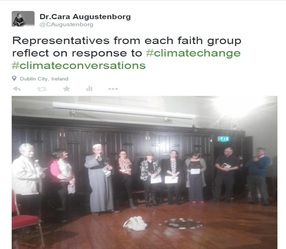
- Natasha Harty from EcoCongregation Ireland: ‘Loving my neighbour means not emitting so much carbon dioxide that I flood their delta.”
- Actress and Writer, Melanie Clark Pullen: “Will my daughter turn to me in 20 years’ time and angrily ask, ‘How did you think you could carry on living like you did? It’s not fair!’”
- Fr. Sean McDonagh, who explained that our religious models must encourage solidarity, not just with other humans, but with all creation around us.
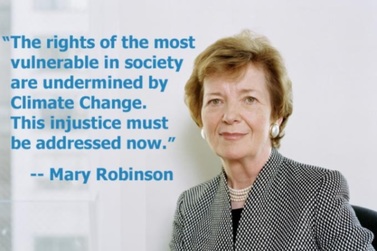 www.mrcjf.org
www.mrcjf.org Given that there are so many compelling moral reasons to act on climate change and so many inspirational people pronouncing these reasons, why isn’t the climate justice argument having greater impact?
Have we ever succeeded in protecting the environment based on justice or morality?
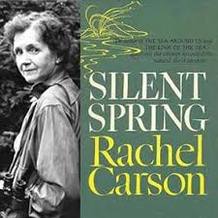 birdnote.org
birdnote.org That got me thinking about the times when society has been successful in achieving environmental victories, moments like those inspired by Rachel Carson’s ‘Silent Spring’, which resulted in a U.S. ban on DDT pesticides, or the signing of the Montreal Protocol, which protected the ozone layer by phasing out CFCs worldwide. I wondered what arguments were used to elicit such strong global agreements and protection of our environment.
While the science of how CFCs contributed to destruction of the ozone layer was less certain than the science of climate change, the Montreal Protocol took less than 18 months to agree globally. There are lots of articles explaining the many reasons for its success and what we can learn with respect to consensus on climate change, but I couldn’t find any that mentioned a moral argument to protect future generations as a reason for agreement. Rachel Carson’s ‘Silent Spring’ appeared to have a moral argument to protect nature, but the analysis of her success indicates that prior to her book, destruction of nature had not raised much public concern and that it was Rachel’s extension of the impacts of DDT on contamination on the food chain, cancer, and genetic damage that were ‘too frightening to ignore’.
I polled some of my friends on this topic and none of us could think of a global environmental issue that succeeded based on a moral/justice-based argument. When we have acted unanimously on an environmental issue, is it simply because we’re trying to protect ourselves rather than out of a sense of moral obligation?
Has morality ever won a political argument?
What’s the missing link between winning the political argument on climate action and climate justice?
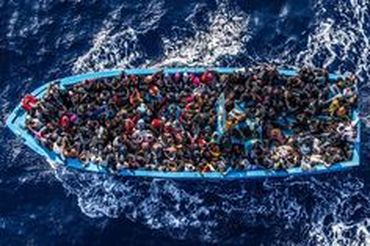 time.com
time.com This week’s refugees are not the only recent deaths related to climate change. The Syrian civil war, which has killed more than 200,000 people in the last four years, has recently been attributed to climate change resulting in widespread drought, migration and resulting conflict. The Philippines lost nearly 10,000 people to Typhoon Haiyan in 2013, and this year thousands of people on the island of Vanuatu were left homeless and without food at the mercy of Cyclone Pam. Such events are becoming more frequent and more intense as a result of climate change.
| A DARA report estimated that five million deaths in 2010 were related to climate change and fossil fuels, making climate change one of the leading causes of death in the world. (For comparison, cancer causes about 7.6 million deaths per year). Eighty-three percent of the deaths due to climate-related factors happened in low-carbon-emitting developing countries — in other words, the places least responsible for climate change and the definition of climate injustice. |
There is evidence to indicate that nearly every humanitarian crisis on the globe can be linked to or is worsened by climate change, and yet we don’t see that link being clearly made in the mainstream press. I can think of a number of well-known Irish people who have been very active in fundraising for the Philippines relief effort and yet don’t think much about climate change. Our Taoiseach, Enda Kenny, is at the E.U. refugee crisis meeting as I write yet he is infamous for arguing that Ireland should have “special concessions” so as not to have to reduce our greenhouse gas emissions. As compelling an argument as climate justice is, if we don’t directly relate it to recent human atrocities, it is merely just a concept and doesn’t convince anyone to take real action on climate.
Lessons learned on climate justice
 pixgood.com
pixgood.com I remember the Ireland that Asad described – visiting my family here as a child growing up in the United States thirty years ago, being aware of how economically and socially deprived Ireland was with its crumbling roads and cold, damp houses. It was only the lucky few in my family who didn’t have to emigrate from Ireland to find jobs, and I was a product of that immigration. Asad’s comment reminded me of that Ireland of the past, and I thought about those 900 souls who drowned this week and how our own development and prosperity has contributed to those people facing hardship the way the Irish once faced. If anyone in the world should be fighting for climate justice, it is the citizens of Ireland who still remember what poverty and forced immigration means to the people of a developing country.
Our current crop of politicians seem to have blinders on to anything that doesn’t involve job creation and immediate economic gains for Ireland, but I don’t believe our citizens are so narrow-minded. Ireland has always been an extremely generous society, giving to causes and countries who are not as privileged as we have become. It’s time we remind our politicians of that Irish spirit and force them to act swiftly and strongly to help combat climate change – Sitting on the fence or doing the bare minimum is, quite simply, immoral.

-Cara
- Asad Rehman's talk for Friends of the Earth Ireland is available on their YouTube channel here
- The Prophetic Voices climate conversation hosted by Christian Aid, Trocaire, and Climate Gathering is available here

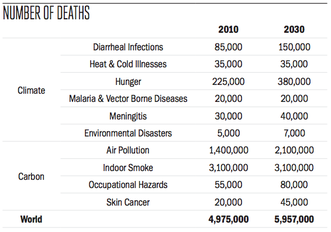
 RSS Feed
RSS Feed
